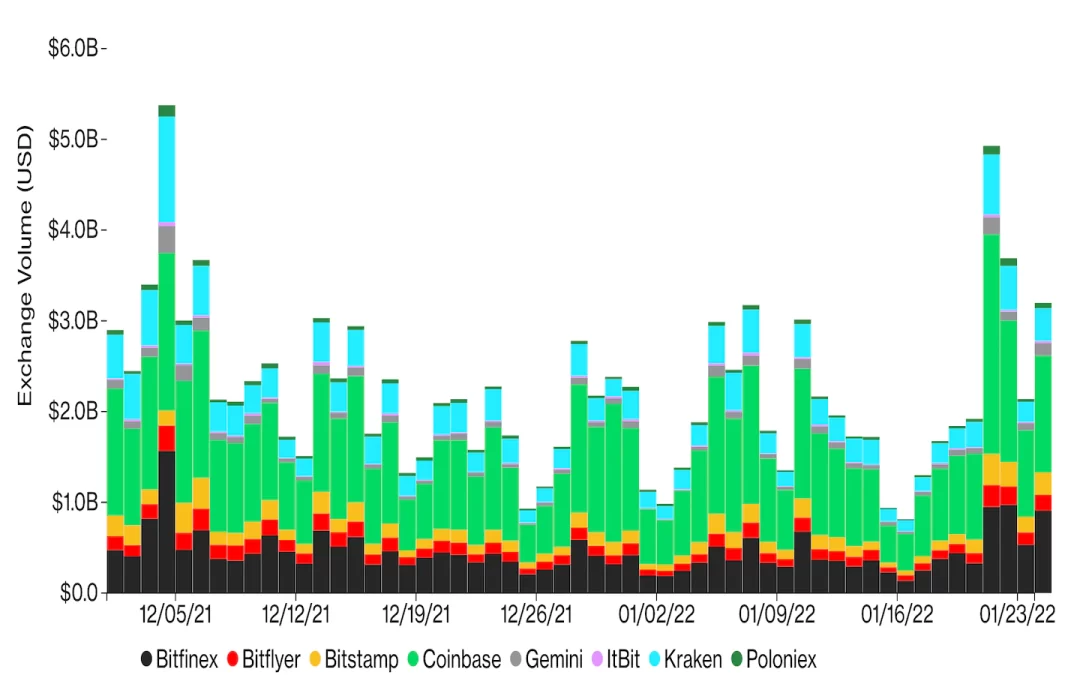Cryptocurrencies are starting to stabilize after declining sharply over the past week. Some indicators show investor sentiment at extremely bearish levels, which typically precede periods of buying activity. Other technical measures, however, suggest choppy price action could persist over the short term.
Bitcoin returned to above $35,000 and was up 3% over the past 24 hours, versus a 5% decline in SOL and roughly flat performance in ETH over the same period.
Still, it might be too soon to call a price bottom. “I think the determination of a bull/bear market is not as clear as previous cycles, due to the structure of the market changing drastically with institutions entering the space,” Marcus Sotiriou, an analyst at the U.K.-based digital asset broker GlobalBlock, wrote in an email to CoinDesk.
“Now, it is apparent that bitcoin is in a ranging environment (between $29,000 to $69,000 approximately) rather than a trending environment,” Sotiriou wrote.
“Bitcoin’s recovery is a long shot as investors are more keen on the price being stabilized for now,” Alex Axelrod, founder and CEO of Aximetria, a crypto financial services firm, wrote in an email to CoinDesk. Axelrod is monitoring BTC price levels of between $32,000 and $40,000 for confirmation of a breakdown or breakout.
Latest prices
●Bitcoin (BTC): $36925, +4.41%
●Ether (ETH): $2448, +0.88%
●S&P 500 daily close: $4410, +0.28%
●Gold: $1842 per troy ounce, +0.56%
●Ten-year Treasury yield daily close: 1.74%
Bitcoin, ether and gold prices are taken at approximately 4pm New York time. Bitcoin is the CoinDesk Bitcoin Price Index (XBX); Ether is the CoinDesk Ether Price Index (ETX); Gold is the COMEX spot price. Information about CoinDesk Indices can be found at coindesk.com/indices.
The chart below shows the recent increase in bitcoin’s spot trading volume. Short-term traders have been active despite the uncertainty regarding future price direction.
Short-term holders underwater
Losses are adding up for most short-term bitcoin holders, according to blockchain data.
The chart below indicates that 18% of short-term bitcoin holder supply is at a loss (BTC trading below its average cost basis), which could point to further selling. A similar scenario occurred during the 2018 bear market and subsequent price corrections.
Still, long-term bitcoin holders appear unfazed by the recent price dip. “The proportion of long-term holder supply has actually returned to a modest uptrend, which indicates a general unwillingness for this cohort to liquidate,” Glassnode, a crypto data firm, wrote in a blog post on Monday.

Crypto funds attract fresh capital
Inflows into digital-asset funds last week – after five straight weeks of outflows – suggest investors were taking advantage of the price dip.
Cryptocurrency funds brought in $14.4 million of new investor money during the seven days through Friday, ending a streak of five straight weeks of outflows, according to a report Monday from the digital-asset manager CoinShares.
Last week’s inflows were led by bitcoin-focused funds, which brought in $13.8 million. Meanwhile, ethereum-focused funds suffered $15.6 million of outflows. Read more here.
Altcoin roundup
- Solana Slides 17% to lead losses amid crypto market plunge: Major cryptocurrencies fell as much as 17% in 24 hours as the crypto market followed a broader decline in U.S. stock index futures on Monday. Last Friday, traders complained about network congestion on Solana and doubted its ability to attract real capital with that kind of meltdown. Solana has been attractive to large trading shops partly because it has prioritized scale. Still, when the network gets overcrowded, it has shown that it can stall out. Read more here.
- Luxor tries to keep Proof-of-Work Mechanism on Ethereum: Crypto software and services company Luxor is launching an Ethereum mining pool even as it is planning to abolish mining from its network. The company is working with large institutional miners, including Hut 8 and several retail miners in North America, to provide a U.S.-based Ethereum mining pool, the company said in a statement on Monday, according to Aoyon Ashraf. Read more here.
- OpenSea bug allows attackers to get massive discount on popular NFTs: A bug on the non-fungible tokens (NFT) marketplace OpenSea has allowed at least three attackers to secure massive discounts on several NFTs and make a huge profit. The bug, which was discovered as early as Dec. 31, allowed the attackers to buy NFTs at older, lower prices, and sell them for a hefty profit, according to Eliza Gkritsi. Read more here.
Relevant news
- Coinbase Taps SEC Counsel Thaya Knight to Manage Public Policy Team
- Bank of America Says US CBDC Would Preserve Dollar’s Status as World’s Reserve Currency
- Chinese Government Rejects Metaverse Trademark Applications: Report
- Singapore VC Blockchain Founders Raises $75M for New Fund
Other markets
Most digital assets in the CoinDesk 20 ended the day lower.
Largest gainers:
| Asset | Ticker | Returns | Sector |
|---|---|---|---|
| Cosmos | ATOM | +17.5% | Smart Contract Platform |
| Stellar | XLM | +10.9% | Smart Contract Platform |
| Litecoin | LTC | +9.8% | Currency |
Largest losers:
| Asset | Ticker | Returns | Sector |
|---|---|---|---|
| Solana | SOL | −3.0% | Smart Contract Platform |
| Filecoin | FIL | −1.5% | Computing |
| Polygon | MATIC | −1.2% | Smart Contract Platform |
Sector classifications are provided via the Digital Asset Classification Standard (DACS), developed by CoinDesk Indices to provide a reliable, comprehensive, and standardized classification system for digital assets. The CoinDesk 20 is a ranking of the largest digital assets by volume on trusted exchanges.










